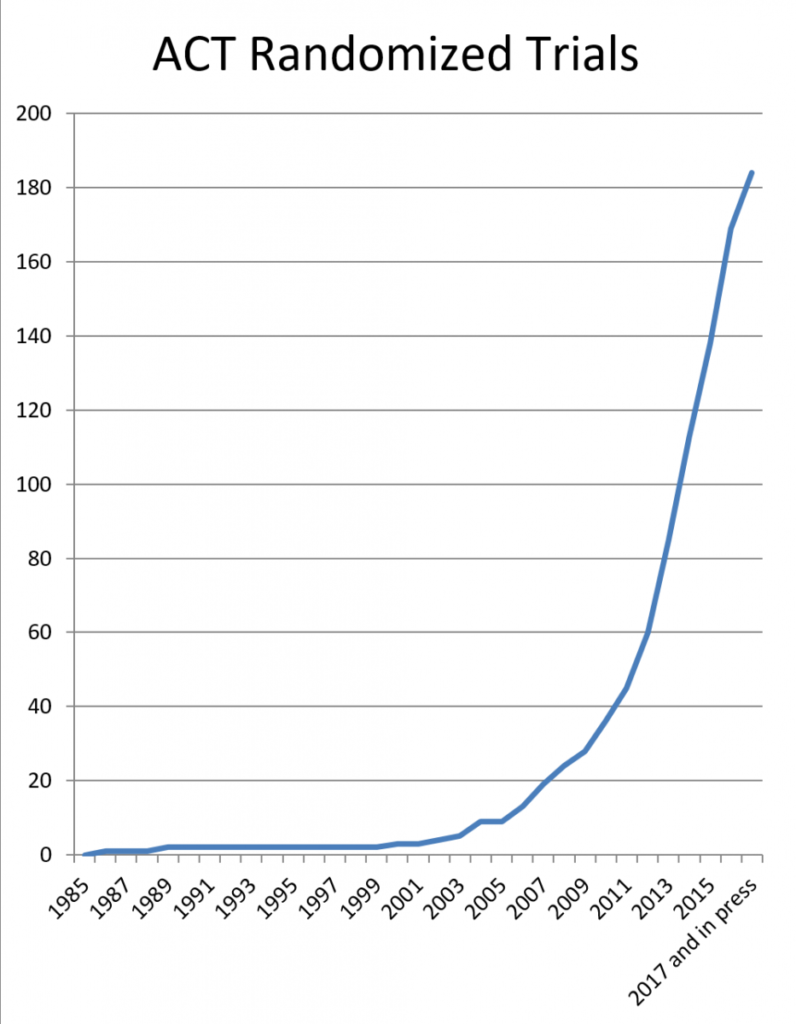By Jason Luoma, PhD, coauthor of Learning ACT, 2nd Edition
I remember when I first started to learn acceptance and commitment therapy (ACT) as a young psychologist.
ACT was so confusing. It’s almost hard to remember how strange it seemed, since today’s methods like mindfulness, acceptance, and values clarification are so widely used. At that time, I had only a couple books to reference and what I’d managed to glean from the workshops I’d gone to and the supervision I’d received. But I wanted more. I wanted a book that would help me to actually learn how to practice the therapy.
So, in 2006, I set out to write that book with the help of Steven Hayes, PhD, and Robyn Walser, PhD, two early pioneers in ACT. It was daunting, but through lots of love and hard work we created the first edition of Learning ACT. It ended up being a pretty darn good book and it sold well, indicating that it seemed to fill a need.
When we wrote the first edition of Learning ACT in 2006, there were only 9 randomized trials on ACT. The therapy was brand new. Today there have been at least 185 randomized trials, with another several dozen in Iran and China that aren’t accessible to English-language audiences. The explosion of research in just the last decade amazes me. There are scores of other studies looking at the components of ACT (e.g., the six flexibility processes), showing that each one is psychological impactful on its own. Mediational studies also show that ACT works, at least in part, through the mechanisms that it attempts to target.

It’s clear now that ACT has gained a lot of momentum and is now a broadly accepted evidence-based therapy. There are now more than a hundred books about ACT, adapted for all kinds of topics. The model has been tweaked and refined as result of listening to what the data have to say. New clinical innovations have been created and incorporated. And there are now many flavors of ACT. We’ve learned so much as a community, but not all of these changes have made it into the books that are available yet.
Here are a couple changes that are happening in the ACT world that I think we will see as new books are written and older ones are updated:
1. Over the last decade, the concept of self-as-context has been greatly clarified and made much more useful. This change hasn’t really made its way into ACT books yet, but it’s coming. Self-as-context used to be difficult to understand and hard to know how to use in practice, but new developments have made it much more user friendly and straightforward. Changes in how to use self-as-context have also tightened the link between ACT and the growing literature on compassion and self-compassion. The links between self-as-context and its underlying model of language, relational frame theory, have also been tightened. These changes are reflected in a completely rewritten chapter on self-as-context in our second edition of Learning ACT. We even went so far as to rename the chapter “Building Flexible Perspective Taking.”
2. The international growth of ACT and growing diversity inside the US has increased the push to consider culture and identity in how ACT is implemented. Recent political events in the US and worldwide have made the topic of inclusivity and diversity even more important. The need to address these issues is receiving more attention from prominent ACT writers, clinicians, and researchers and inside the Association for Contextual Behavioral Science (the home and community of professionals who study and practice ACT). Issues of multiculturalism and cultural adaptation of treatment models are increasingly being attended to and new thinking is occurring. You can read an overview of some of these developments in a new chapter about adapting ACT to diverse cultural contexts in the second edition of Learning ACT.
So much has changed in the last 15 years in psychotherapy, and ACT has been at the vanguard of these changes. We’re working hard to keep up with the changes and hope this updated resource makes it a little easier for you as well.
Craving more on ACT? Check out our premiere ACT trainings!
